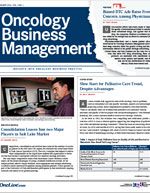Palliative Care Makes Good Business Sense
More models of care are beginning to show signs of recognition that palliative care has a larger role to play in the oncology setting.
OncLive Chairman,
Mike Hennessy
More models of care are beginning to show signs of recognition that palliative care has a larger role to play in the oncology setting. A story by Matthew Mahady in this month’s Oncology Business Management conveys a plethora of evidence that quality of life is improved for patients. Aggressive strategies that may prolong cancer treatment beyond the point of productivity are clearly not the choice for all patients when they are presented with an opportunity to express their needs and preferences, although the context and conversation may not be an ideal experience for the physician.
“Some doctors are a lot more prepared than others, who feel it’s a failure to not be able to change the course of defeat,” David Hui, MD, of MD Anderson Cancer Center, University of Texas, told Mahady in an interview. “I tell patients we can always hope for the best, but we also have to be prepared. This is what end-of-life conversations are all about: to help patients think about backup plans in case their ‘Plan A’ doesn’t work. With better training for oncologists and more research, we’ll be able to shift the bell curve and have more oncologists be even more comfortable talking about these kinds of difficult issues,” Hui said.
Citing solid research and their own clinical experience, physicians like Hui indicated that a patient’s sense of well-being can improve significantly through the intervention afforded by palliative care. There clearly are substantial cost and survival benefits also associated with provisions that incorporate this form of end-of-life management. Earlier palliative care is associated with fewer hospitalizations, fewer emergency department visits, and fewer hospital deaths, Mahady reports.
Why it has taken so long for this realty to influence care strategies may be rooted in multiple factors, but Shelley Fuld Nasso, CEO for the National Coalition for Cancer Survivorship, believes that an awakening on the level of a “Big Bang” is happening. For oncologists who want to remain focused on the healing arts and who may have difficulty with this end-game aspect of patient interaction, Fuld Nasso suggests that palliative care physicians be involved in the process. “Palliative care physicians are really great at having these conversations, partnering with oncologists in academic medical centers where palliative care is integrated. Most patients don’t have access to that. All patients need to be able to have those conversations, regardless of where they are treated,” she told Oncology Business Management.
Payers are on board with this. Michael Kolodziej, MD, national medical director for oncology solutions at Aetna, says that the way to have that dialog with a patient is to open the door over a series of visits. “These discussions don’t happen in one sitting. The dialog occurs over time. Oncologists have done a very poor job. We need to do a better job. We have gotten into a default mode in which we believe most patients want everything done unless they tell us otherwise, and there’s actually tons of data that show that that is not a fact,” he said.
It’s not just the payer bias in favor of cost savings talking in this instance; otherwise, there wouldn’t be other oncologists saying the same thing, with data to back them up. We hope you find this article interesting and relevant to your needs, along with all of the other stimulating content in this month’s issue of Oncology Business Management.




